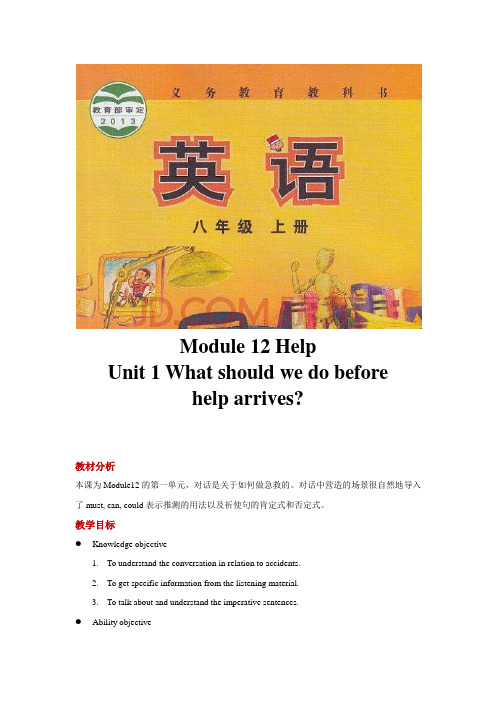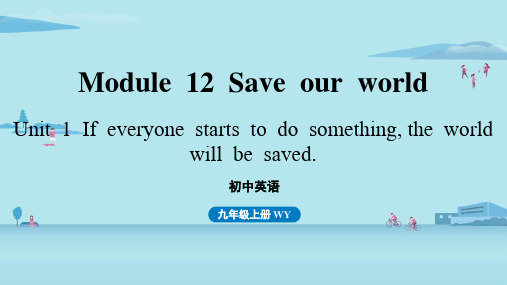Module12Unit1
Module12Unit1课件英语九年级上册【01】

The air pollution in our city is getting worse.
--What can we do to stop it? --I think we can/cannot...
plant more trees
walk or ride a bike to school
--What causes water pollution?
It makes people ill, and may even kill they.
--What else can we do to stop it? --I think we can/cannot...
build a green school save energy and recycle wastes
1.enemy(n) 敌人
[pl] enemies
(v)污染 pollution(n)污染 塑料会造成污染。 The plastic will pollute the environment.
4.(n)石油(不可数)
(n)废弃物;浪费
5.It’s no use doing sth. 做某事没有用处 (n)浪费 It’s useless to do sth. 做某事没有用处 你不应该浪费钱。
Factories produce the waste water(废水)every day.
The water pollution in our city is getting worse.
--What can we do to stop it? --I think we can/cannot...
2 In some places, pollution from factories _________ _s_p_r_e_a_d_s_o_v_e_r_c_i_ti_e_s_a_n_d__v_il_la_g_e_s_.
初一英语Module12 Unit 1

初一英语Module12 A holiday journeyUnit 1 I went to Los Angeles two years ago.课型:Listening and speaking方法:Bottom-up approach目标:To understand conversations about holiday journeysTo process main information of holiday experienceTo talk about holiday journeys核心内容:Key vocabulary—oil holiday,journey,have a great time, meet,spend Key structures—past simple irregular verbs教具:Tape recorder,video,OHP,handouts教学建设一、Warming-up,Lead-in(Activity 1)学生个体活动,自己先独自完成,教师点名展示。
二、Listening(Activities 2~5)1.Listen and follow Betty’s journey.(Activity 2)集体听,同伴核对,小组提问。
2.Listen and read (Activity 3)★拓展Language points1)What are you going to do on holiday, Tony?be on holiday 或have a holiday 意为”在度假”Eg. We visited many places on holiday. 我们假期参观了许多地方。
2)We had a great time. = We enjoyed ourseleves a lot.have a great/good time和enjoy oneself都是“玩得很高兴”的意思。
外研版英语七年级下册Module_12_Unit_1课件PPT

Fill in the blanks with the right forms.
1.What
___ you __ on your last holiday? (do) did do 2. I went to Hollywood two years ago. (go) ____ 3. How did Betty _____ there yesterday? spend (spend) 4. Where did you often _____? (swim ) swim 5. My mother met at the station last weekend. ___ (meet)
Read and answer the questions.
1. When did Betty go to Los Angeles on holiday? She went two years ago. 2. How long did it take her ? It took her about nine hours. 3. Where did she go ? She went to Disneyland then Hollywood and finally Santa Monica.
Do you like them?
Mickey Mouse
Donald Duck
Where can you see them?
Disneyland
California
Which country is it?
The United States of America
Listen and answer.
4. How long did Betty spend in Disneyland? She spent two days in Disneyland. 5. What did Betty do or see at Santa Monica? She swam in the Pacific Ocean. 6. What was Santa Monica like? She thought it was great.
外研版七年级下册英语《module 12 unit 1 it’s so beautiful!》教学设

外研版七年级下册英语《module 12 unit 1 it’s so beautiful!》教学设计一. 教材分析外研版七年级下册英语《Module 12 Unit 1 It’s so beautiful!》主要介绍了描述物体特征的表达方式。
通过本节课的学习,学生能够掌握表示方位的词汇和句型,如up, down, left, right, in front of, behind等,并能够运用这些词汇和句型描述物体的位置和特征。
教材内容贴近学生生活,激发学生学习兴趣,培养学生的观察能力和表达能力。
二. 学情分析七年级学生已具备一定的基础英语词汇和语法知识,对日常生活中的事物和景色有所了解。
但部分学生对表示方位的词汇和句型掌握不够熟练,因此在教学中需重点关注这部分学生,帮助他们巩固基础知识,提高语言运用能力。
三. 教学目标1.知识目标:–能够听懂、会说、会读表示方位的词汇:up, down, left, right, in front of, behind等。
–能够运用这些词汇和句型描述物体的位置和特征。
2.能力目标:–培养学生的观察能力、表达能力及合作意识。
–提高学生运用英语进行交际的能力。
3.情感目标:–培养学生热爱生活、欣赏美的态度。
–增强学生对英语学习的兴趣。
四. 教学重难点•表示方位的词汇:up, down, left, right, in front of, behind等。
•运用这些词汇和句型描述物体的位置和特征。
•灵活运用表示方位的词汇和句型进行描述。
•正确理解并运用英语描述物体的位置和特征。
五. 教学方法1.情境教学法:通过设定生活情境,让学生在实际语境中学习表示方位的词汇和句型。
2.交际教学法:引导学生进行小组合作,运用所学词汇和句型进行互动交流。
3.任务型教学法:设计具有挑战性的任务,激发学生的学习兴趣和主动性。
六. 教学准备1.教师准备:–制作多媒体课件,展示生活中的场景图片。
外研版八年级英语上册教案Module 12 Unit 1

Module 12 HelpUnit 1 What should we do beforehelp arrives?教材分析本课为Module12的第一单元,对话是关于如何做急救的。
对话中营造的场景很自然地导入了must, can, could表示推测的用法以及祈使句的肯定式和否定式。
教学目标●Knowledge objective1.To understand the conversation in relation to accidents.2.To get specific information from the listening material.3.To talk about and understand the imperative sentences.●Ability objectiveEnable students to listen to and talk about things that could/can/must happen.Moral objectiveGet the students to know about how to deal with the accidents.教学重难点教学重点:1. New words and expressions.2. Learn the usage of imperative sentences.教学难点:Grasp the phrases and important sentences.课前准备A tape recorder, multimedia and some pictures.教学过程Step 1 Talk in pairs.1. Let Ss look at the pictures and talk about the pictures by using the words and expressions in the box.2. Go through the words in the box with the students.3. Check if the Ss understand the meaning of the words by asking questions.【设计意图】本活动通过观察图片,结合所给单词,让学生初步感知本单元的话题,同时为句型操练作好词汇准备。
外研版九上英语 Module 12 Save our world Unit 1

(2)dangerous作形容词,意为"危险的,有危害的"。▶Robots take on jobs that are too dangerous for people to do by themselves. 机器人承担那些对于人类来说太危险而不能自己做的工作。(选自福建中考)
▶The natural environment is badly polluted with plastic bags.自然环境被塑料袋严重污染。(选自锦州中考)
拓
语境串记Pollution(n.) from factories polluted(v.) the river and the polluted(adj.) water is a danger to people's health. 来自工厂的污染物污染了河流,被污染的水危害人们的健康。
Don't waste time playing computer games. 不要浪费时间玩电脑游戏。
教材原句 Pollution is our great enemy,and we have to fight it. 污染是我们强大的敌人,我们必须与它作斗争。(教材P96)
enemy(复数形式为enemies)/'enəmi/ n. 敌人;仇人
▶Tomorrow is Earth Day. Let's discuss what we can do to recycle things.明天是地球日,咱们讨论一下做些什么来回收利用东西吧。(选自连云港中考)
教材原句 waste 废弃物(教材P96)
外研版初中英语八年级上册(WY)教案 Module 12 Unit 1

Module12 Help一、教学内容:Unit 1What should we do before help arrives?二、课型:Listening and speaking三、教学目标:1、能够正确使用下列单词和词组: broken, glass, medical, imagine,bottom, at the bottom of…, wrong, What’s wrong with …?, trouble, lift up, drop, make sure, have trouble doing sth., cover…with…, No, that could be harmful….2、能够正确使用情态动词must, can, could表示推测。
3、能够听懂谈论急救话题的听力材料。
4、能够谈论突发事故及应采取的相应措施。
四、教学重难点:1、能够听懂谈论急救话题的听力材料。
(重点)2、能够谈论突发事故及应采取的相应措施。
(难点)五、教学准备:课堂整体运用任务型教学模式,培养学生独立自主的学习能力。
本课指导学生通过听说获取信息,培养学生的听说技能。
在教学过程中,采用多媒体手段辅助教学,利用各种图片和习题任务贯穿整个教学过程。
因此,本节课需准备:PPT课件、挂图、课堂练习表格、奖品六、教学过程:七、板书设计:Module 12 HelpUnit1. What should we do before help arrives? imagine, imagine doing sth. e.g. I often imagine flying in the sky.bottom, at the bottom of… e.g. Shall we have a picnic at thebottom of this mountain?wrong, What’s wrong with …? e.g. What is wrong with you? trouble, have trouble doing sth. I have trouble finishing the homework by myself.make sure Make sure it’s safe to stay here. cover… with…, Can you cover the boy with a coat? No, that could be harmful.达标训练题一.用所给词的适当形式填空:1. Look! The boy is _________(lie) on the floor.2.The little girl has trouble __________ ( speak).3. It is ______( harm) to read in the sun.4. The students made their teacher ____________.(angry).5. What could we do before help ___________(arrive)?二、选择正确的答案:( ) 1.—What’s ________ with you ?— I have a bad cold.A. problemB. matterC. troubleD. wrong( ) 2. The boy is hurt badly. He is _____ pain.A. inB. onC. atD. of( ) 3. That’s such good advice that you ________ be a doctor.A. couldB. shouldC. willD.would ( ) 4. We should shout ____________ when we are in danger.A. of helpB. to helpsC. for helpD. at help ( ) 5. —Look at the light! Someone ______ be at home.— Yes, you’re right.A. canB. mustC. can’tD. mustn’t。
外研版(新标准)九年级上Module12 Unit1课件(共41张PPT)

/'enəmn.
庄稼;作物 n.
enemy
crop
/kɪl/ /ɒɪl/
杀死;弄死 v. 石油 n.
kill oil less
/les/ /'həʊplɪs/
较小的;较少的 adj. 较少数;叫少量 n.
无望的 adj.
hopeless
Important Phrases
1. at a green school 在环保学校 2. collect waste 收集废品 6. Save money and recycle 3. sell the waste 节约钱并回收 卖废弃物 7. start to do something 4. in poor areas 开始做些某事 在贫穷地区 5. learn ways to 学习…的方法
3. And there’re so many cars in the street. They use so much oil… 街道上有很多车,他们使用很多石油… so many很多 You can’t crush so many people into the classroom.你不能让这么多人挤进教室。 so much很多 辨析:so many与so much so many 用来修饰可数名词, so much 用来修 饰不可数名词。
7. I don’t think it’s hopeless. 我不认为它是没有希望的.
hope可做名词和动词, 表示“希望”
(1). 用于表示可能实现的事情, 后接从句, 用陈述语气。 I hope I shall see him again. 我希望再见他一次。 (2). Hope 多用于指多好事物的盼望, 预想; 对 坏事物的预想多用I am afraid… I hope it will be fine tomorrow. 我希望明天天气好。
- 1、下载文档前请自行甄别文档内容的完整性,平台不提供额外的编辑、内容补充、找答案等附加服务。
- 2、"仅部分预览"的文档,不可在线预览部分如存在完整性等问题,可反馈申请退款(可完整预览的文档不适用该条件!)。
- 3、如文档侵犯您的权益,请联系客服反馈,我们会尽快为您处理(人工客服工作时间:9:00-18:30)。
Module 12 Save our world
Unit 1 If everyone starts to do something, the world will be saved. Teaching steps:
Step 1. Warming up
Look at the pictures and talk about the questions about pollution in our environmental situation
Step 2. listen and learn
1) listen to the tape and review the words
factory, pollute, recycle, waste, enemy, crop, kill, oil, less, hopeless,
2) listen with purposes:
Step 3. learn the dialogue
Key words and expressions:
1. Hey, you guys! Guess what! 喂,伙计们.猜猜
2.At a green school.在环保学校
3 collect reusable waste收集再利用的费品
4. Sell sth. to卖某东西去..
5. Save energy/ waste electricity节能/费电
Step 4.Practice after the dialogue
1) Connecting the sentences according to the dialogue
1. Zhao Ming first saw New Standard while
he was doing his homework on favorite books
2. Zhao Ming wants to know when
They are going to write about environmental education.
2. In a green school everyone agrees we must be careful with environment/help save our world.
3. We can save our world if everyone thinks about pollution and recycling.
2) Fill in the best words:
1. Cycling to school is both__________ and environmentally friendly
2. You really need to be ________ with things bad for the environment.
3. Everybody can do a little bit to help with _____________problems.
5. It is _______to throw away the_________ shopping bags.
6. Scientists are_________ about new ways to save energy.
Step 5. Listen again and discuss questions:
1)What we should do?
2)What we shouldn’t do?
Step 6.Pronunciation and speaking
1. When are you going to write about environmental education?
2. it’s wasteful to throw away glass. paper. and metal. So every class collects reusable waste.
Step 7 language points
1.And in some places, pollution from factories spreads over cities and villages.
在一些地方,来自工厂的污染遍布城市和村庄。
spreads over遍布在..., 复盖在...
What he studied spread over many fields.
他所研究的内容涉及许多领域。
2.Pollution is a danger to our health. 污染有害我们的健康。
a danger to…“对…是一种威胁;有伤害”,
相当于be dangerous to
It is a danger to your computer's health.
=It is dangerous to your computer's health.
这对你电脑的健康是个威胁。
3. And there’re so many cars in the street.
They use so much oil…
街道上有很多车,他们使用很多石油…
so many很多
You can’t crush so many people into the classroom.你不能让这么多人挤进教室。
so much很多
辨析:so many与so much
so many 用来修饰可数名词,so much 用来修饰不可数名词。
There was so much noise outside that we
couldn’t hear the teacher.
外面嘈杂声很大,以致我们不能听到老师的话。
He feels nervous when her faces so many people.
面对那么多人,他感到紧张。
4. as well 也;又
拓展:
(1). 相当于too或also, 常位于句末,无须用逗号与句子隔开。
I am going to London and my sister is going to as well.
我要去伦敦,我妹妹也去。
(2).as well 在口语中也可置于句中,作“也好,
也行”或“倒不如”解。
用来缓和语气。
You may as well go.你去也好。
(3). As well 也可以直接用于just之后,用作应答
语。
可视为(It’s just as well)的省略。
作“幸亏,
幸而,无妨,没关系”讲。
-We are too late to see the film.
- Just as well, I hear it isn’t very good.
5. Such as …?例如……
such as 表示举例,意为“例如,诸如此类的,像……那样的”,相当于like 或for example。
Animals such as rabbits and deer continue to be active all winter.
像兔和鹿这样的动物整个冬天都很活跃。
There are few poets such as Keats and Shelly.
像济慈和雪莱这样的诗人现在很少了。
6. That means less waste.
(1). less 较小的,较少的;较少数,较小量
1). less 是little(小;少)的比较级。
He spends less time (in) doing experiments.
他做实验花的时间较少。
2). “less+形容词或副词”构成比较,译为“较不更不”。
It is less cold than it was yesterday.
天气不如昨天冷
3). Less作名词时,表示“较小量,较少量”
Less than ten of the thermometers remain.
这些温度计剩下不到十支。
4). less 作介词时,译为“不足,还差”
Five less two leaves three. 五减去二余三。
The time cycle is a year less three days.
(时间)周期是差三天一年。
7. I don’t think it’s hopeless.我不认为它是没有希望的.
hope可做名词和动词,表示“希望”
(1). 用于表示可能实现的事情,后接从句,
用陈述语气。
I hope I shall see him again. 我希望再见他一次。
(2). Hope 多用于指多好事物的盼望,预想;对
坏事物的预想多用I am afraid…
I hope it will be fine tomorrow.
我希望明天天气好。
(3). hope 所希望的一般指将来或现在的事情,不指过去的事情。
I hope he will come. 我希望他会来。
(4). Hope 可用于hope to do 结构,但不能说
hope sb. to do sth.
I hope to watch the football match again.
我希望再看一次那场足球赛。
Step 8. Homework:
1.act out the dialogue with their partners
2.Discuss how to protect the environment.。
